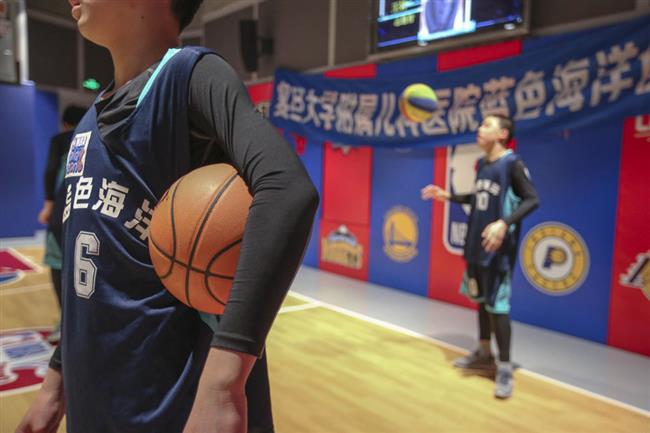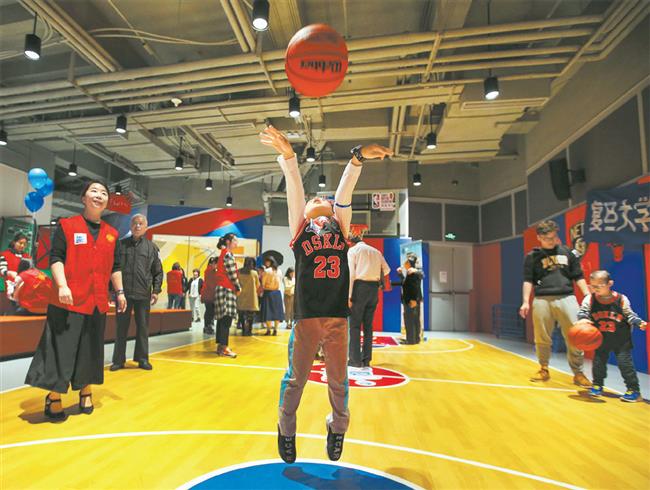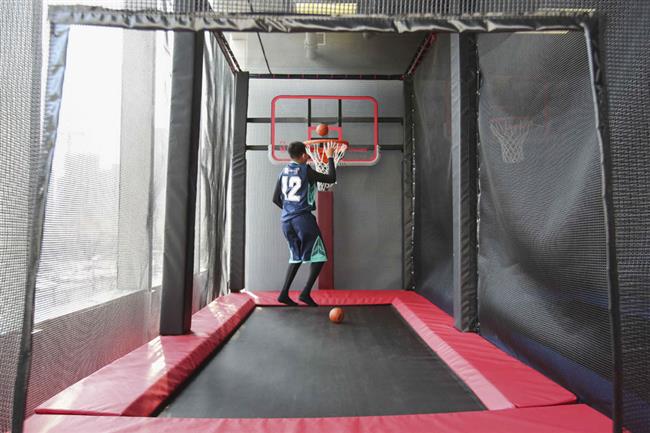
Players from a special basketball team comprising autistic children play at the NBA Play Zone basketball court in Xintiandi yesterday. The team was set up by Children’s Hospital of Fudan University a year ago.
PARENTS who took their children to the basketball Play Zone in Xintiandi yesterday morning couldn’t help but notice that the playground was decorated in blue. It was to welcome a special basketball team, one comprised of autistic children.
The players drew rounds of applause despite their sometimes awkward movements. Bouncing a ball or lining up for a shot may be easy for most children, but such skills can be daunting for an autistic person.
The special team players, aged between 10 and 12, have all been diagnosed with severe autism.
The team was formed a year ago at the Children’s Hospital of Fudan University to mark World Autism Awareness Day, which is being celebrated today across the globe.
“The first day was a bit of a mess,” said Liu Siyuan, team coach and also a kindergarten teacher. “The kids were everywhere. It seemed impossible to coordinate them all.”
Shanghai had more than 8,000 children categorized as “exceptional” as of last September. Half were in mainstream education. More cases are being diagnosed.
Xinhua Hospital treated 1,000 autistic people last year, and the number was rising annually, it said.
“That’s because there is a rising awareness by families and teachers,” said Zhang Jingsong, an expert on autism at the hospital. “Yet, the lack of integration between education and treatment for these kids remains stark.”
Zhang said most professional organizations providing education to autistic children focus on serious social or mental problems. For those with less severe cases and a higher functioning ability, integration in mainstream classrooms hasn’t gone far enough, she added.
Xu Xiu, director of the Children’s Hospital child healthcare department, said studies show that sports are beneficial to the development of children, and the autistic are no exceptional. A group sport like basketball can teach children teamwork, health competition and personal discipline.
 Wang Rongjiang / SHINE
Wang Rongjiang / SHINEA 7-year-old boy shoots a basketball while participating in an activity for autistic children in Shanghai yesterday.
Most autistic kids have difficulty concentrating and following orders, and many have individual behavior traits that make teamwork hard to coordinate.
“But the individual nature of autism is part of the reason why we started the team,” said Xu. “With the right methods and a lot of patience, we can teach these kids to cooperate. These kids can and do learn. They just need more time and more detailed instructions.”
It took coach Liu several months to become familiar with the particular behavior of each child. He then drew up individualized plans to help them. Though the team players aren’t at the stage of playing a match yet, they have learned how to follow the directions of a referee. More importantly, they are having fun.
Ding Ding is one of the players. After the exercise set yesterday, he went up to Liu, waved and said hello.
Liu tried a “high five” to return the greeting, but it failed to register. Yet progress is discernible.
“This kid refused to talk to anyone when he first came to the team,” Liu explained.
Dou Dou, another player on the team, was playing with a basketball and laughing. His mother said her son has become passionate about the game.
“Every time we say ‘basketball,’ he repeats the word with glee,” she said.
 Wang Rongjiang / SHINE
Wang Rongjiang / SHINEThe children and their parents meet with social workers and the team coach five times a month for lessons that last about an hour. Their performances are analyzed.
All the children are tested periodically on their ability to recognize things and to communicate, as well as on their cardio-pulmonary functions.
This year, the basketball team will add some players in the 3-6 age group. All of them will be boys. Xu said the ratio of boys to girls diagnosed as autistic is about 4-1. She said she is considering creating a cheerleading team of autistic girls, but that’s not formalized yet.
“Eventually the goal for these children is to help them lead independent lives,” said David Wu, father of a third-grader Fei Fei, who was diagnosed as autistic when he was 2.
Wu said having an autistic child has taught him a lot about the mental disability. He recounted how he used to take his son to a market to buy him a can of cola.
Fei Fei knew how much a can of Coke cost and where to find it on the shelves, but he didn’t know how to wait in the check-out queue.
“Other things would divert my son’s attention,” said Wu. “He couldn’t distinguish what was important and what was not.”
Fei Fei is the only member of the basketball team who is attending mainstream classes.
The rest attend special schools for the mentally impaired. His primary school has a special education teacher for children with physical or mental problems.
“The system is more concerned than it used to be,” Wu said, “but lack of education resources is still the biggest problem.”
Names of the children and parents have been altered to protect privacy.
